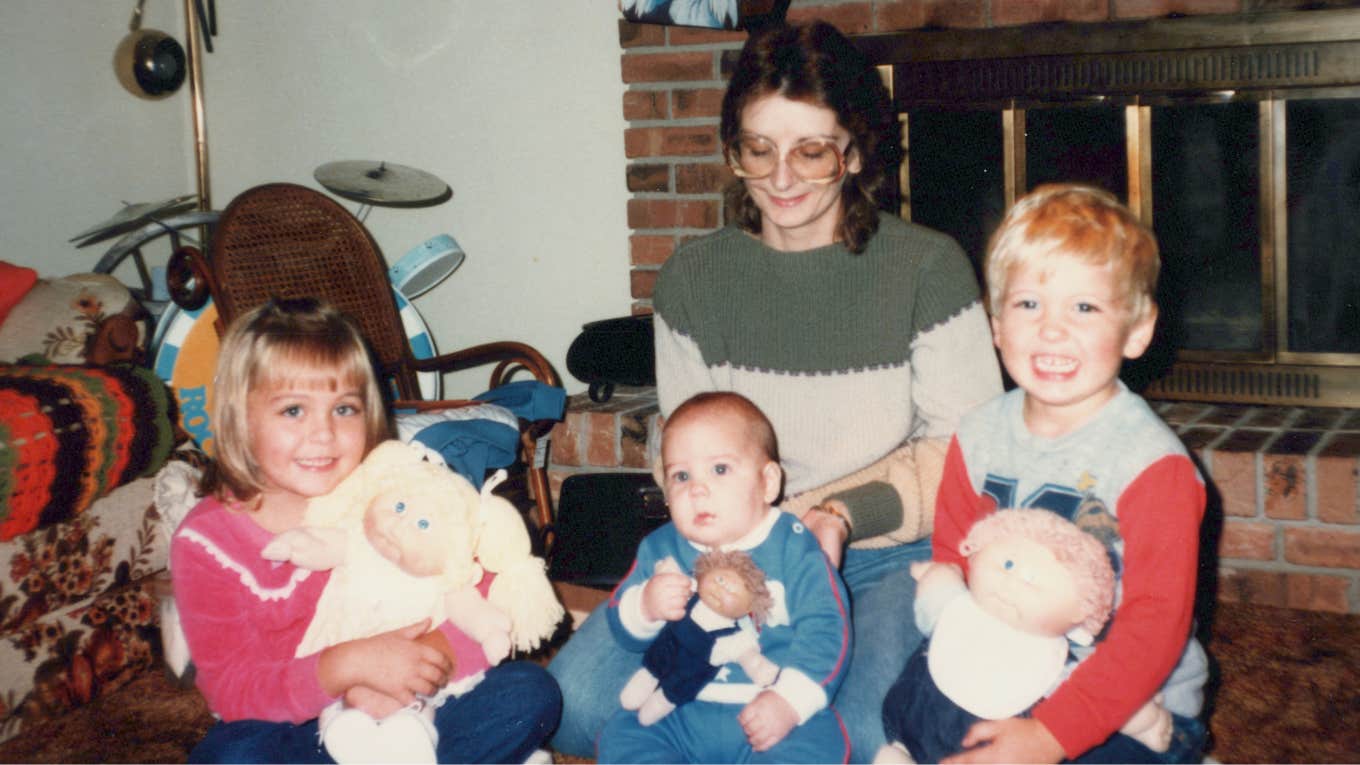Parent Like It’s 1985: 8 Retro Parenting Habits That Are Suddenly Trendy Again
Are the secrets to good parenting back in the 1980s?
 melissamn | Shutterstock
melissamn | Shutterstock "Parenting was so much easier in my day" is a thing you hear boomers say all the time. The missing context, of course, is that a lot of them were a bit TOO lax as parents and let their kids run feral (don't ask me how I know!).
But at least one modern mom says the secrets to parenting do, nonetheless, lie in the halcyon days of neon and hairspray-crispy bangs: the 1980s. In an Instagram post, creator and mom Vanessa Eves shared that her parenting philosophy is to "rewind 40 years," and it's hard not to feel like she's onto something.
A mom shared 8 retro parenting habits from the 1980s that are surprisingly effective:
As a kid who grew up in the '80s, it really was the golden age of being a kid, and not only because we were typically left unsupervised to play on the freight train tracks behind the subdivision like the kids in my neighborhood.
 melissamn | Shutterstock
melissamn | Shutterstock
Though we had plenty of technology (Atari and Nintendo, anyone?), we weren't shackled to it like we are now. And science has begun to back up what so many of us already sensed from experience: We were calmer, more engaged, had richer creative and social lives, and were probably easier to parent than kids nowadays.
Eves is an '80s kid herself, who grew up in New Zealand, and in her Instagram post, she shared how that has shaped her approach to her own kids now that she's a mom. And while some of her eight tips might be divisive, they certainly give parents lots to think about.
1. Saving gifts and buying them stuff for special occasions
"Presents are for birthdays and Christmas," she said. "They just don’t need loads of toys and need to learn the value of being gifted something." Hear, hear. In some families, it has even become a tradition to get EVERY kid a gift on their sibling's birthday so they don't feel left out. (Don't ask me how I know this.)
And while that's nice and all, it not only erodes the specialness of receiving a gift when it's your turn to be the birthday boy or girl, but it also robs kids of the opportunity to learn things like patience and gratitude. They don't need all that, and they'll be fine experiencing a moment of disappointment!
2. Teaching them resilience
I can already hear you typing an angry comment, so stop right there: There is a vast grey area between the extremes of "tough love" (or worse) and doing everything in your power to make sure your kids never experience a single moment of adversity, as has become common today. This is not a binary issue. It's nuanced.
For Eves, it comes down to the simple truth that "there are definitely winners & losers, it’s part of life." She went on to say that "during my childhood, there was a lot of love, but if you weren’t bleeding profusely or you’d lost a limb, you were expected to just get on with it." That's how the real world operates, too, and kids need opportunities to develop the strength and confidence to navigate it like a champ.
3. Limiting screen time
You knew this one was coming, and the science is pretty compelling. From educators sounding alarms about kids lacking fundamental motor skills in their hands, to scientists and pediatricians calling out the cognitive and behavioral detriments that screens' constant stimulation causes, limiting screen time is essential, whether we like it or not.
Eves takes a hardline approach. Her kids "generally only go on them for an hour at the weekend… hardly ever during the week." That's perhaps extreme, but it's food for thought.
4. No video game consoles
"I'm not giving into Xbox," Eve quipped. "Between the TV/Netflix and the occasional use of tablets, that’s enough kids' technology for me!" While video games were common in the '80s, probably most kids back then never had a console, and we had no trouble finding things to do. They'll be fine!
5. No smartphones
 Aiman Dairabaeva | Canva Pro
Aiman Dairabaeva | Canva Pro
Another controversial one, but where the science is not just compelling, but nearly conclusive: Smartphone use by kids is highly correlated with cognitive, behavioral, and perhaps most upsetting, mental health issues.
Many experts suggest, however, not avoiding them altogether but rather waiting until the teen years and allowing phones with heavy supervision. That may be better, as they're going to emerge into a smartphone-filled world regardless. Still, the evidence is clear: They are doing damage, and that needs to be taken seriously.
6. Bare feet outside
Ohhhhkay, here's where things get a little weird, admittedly. "I think it’s important to be close to nature and feel the freedom of grass under your feet," Eves said, though she noted her husband is horrified by their kids' bare feet.
Shoes are probably not the real issue. Having room to roam and explore is. Kids are so tightly managed these days that they often miss opportunities to explore and get curious. Let 'em roam a bit.
7. Letting them get bored
 soupstock | Canva Pro
soupstock | Canva Pro
"If they don’t experience boredom, they don’t get the opportunity to be really creative," Eves said. "My Mum has always said, ‘Inspiration is on the other side of boredom!’ And I wholeheartedly agree."
Experts agree too. Allowing kids to get bored and leaving them to entertain themselves (within reason, of course) not only frees moms and dads from going insane but also allows kids opportunities to develop their own skills, foster independence, and discover themselves.
8. Not worry about what they eat (too much)
I don't think I even HAD a vegetable until I was 37 years of age. I'm kidding, but back in the day, kids hating vegetables was just part of the terrain. Now, many parents panic if their kid won't eat a variety of vegetables that extends beyond "carrots and cucumbers."
"We encourage them to try new things and their taste buds are still developing," Eves wrote. "I grew up on sausage rolls and fairy bread, but now love mushrooms, salmon, and kimchi. There’s time to expand their palates." They'll get there, don't worry!
John Sundholm is a writer, editor, and video personality with 20 years of experience in media and entertainment. He covers culture, mental health, and human interest topics.

